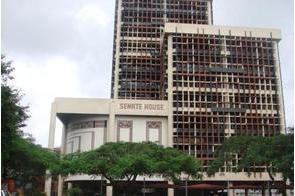NDDC officials tour post-graduate training facilities at UK university

Summary
NDCC funds scholarships for post-graduate students at the Robert Gordon University.
Officials of the Niger Delta Development Commission (NDDC) were taken on a tour of the Robert Gordon University (RGU) in Aberdeen, Scotland, as they visited the Garthdee campus in Aberdeen, a statement from the UK university said.
Jenny Rush, Communications Officer in the Faculty of Design and Technology at the RGU, said Dr. Solomon Ita, NDDC’s Director for Education, Health And Social Services, and another NDDC official, Mr. Eddie Gordon Okeya, toured the DART drilling simulator facility after meeting with various senior management team and academic staff at RGU.
Drilling and Advanced Rig Training (DART) drilling simulator is an engineering system offering real-time drilling simulation and downhole modelling. DART utilises software that allows downhole conditions to be effectively integrated and simulated so that the drilling of wells can be practised by operators and rig crew personnel in a safe environment using the actual well data. It was designed by KCA DEUTAG, one of the world's largest international land drilling contractors and one of the largest platform drilling contractors in the North Sea.
RGU uses the DART facility for postgraduate training programmes. The NDDC officials also met with NDDC’s scholarship students who are studying at RGU. NDCC, which was established in 2000 to foster the development of the Niger Delta region, funds scholarships for post-graduate students at the Robert Gordon University.
“We were delighted to welcome Dr. Ita and Mr. Okeya to RGU to show them the breadth of what we can offer to students who study here,” RGU’s Regional Manager for Africa, Jamie Hastings, said.
Hastings visited Port Harcourt, Rivers State, in the Niger Delta region, along with engineering lecturer Ibiye Iyalla, in November.
“Nigeria continues to be RGU’s largest international recruitment market and we very much value our relationships with organisations such as NDDC and other government departments that fund Nigerians studying overseas,” Hastings said. “We look forward to welcoming NDDC funded students for January 2016 intake in a variety of different courses.”
Roland Tebowei, an NDDC-funded PhD student at RGU, said, “Having a scholarship from NDDC -- that pays for my tuition fees and living expenses -- has been very helpful for my PhD study by removing the financial barriers, which makes my education easier and enables me to focus on my studies and career without thinking of how to fund my education.”
“Studying at RGU for my on-going PhD programme and previously completed my MSc degree at RGU is a unique opportunity, I have had ample opportunity to work and relate with individuals from a wide range of countries,” Tebowei added. “This opportunity has made my time at RGU enjoyable and helped improve my interpersonal skills when relating with people from diverse social-cultural background. Also, I can honestly say that the most valuable opportunity is the helpful support from the academic and non-academic staff at RGU which has helped me succeed in my postgraduate education so far.”
Related
-
Why Nigeria is lacking expertise
In some universities in Nigeria, students in the sciences have never handled a micropipette to work with it.
-
UN chief makes recommendations for reopening schools
António Guterres said the COVID-19 pandemic has created the largest disruption to education in history.
-
Study reveals how developing countries can prevent capital outflow to foreign education
Foreign school fees and related outflows from Nigeria have been rising as standards in public schools have been falling, ...










